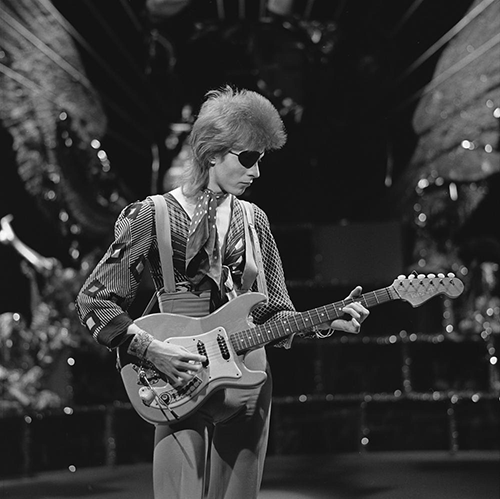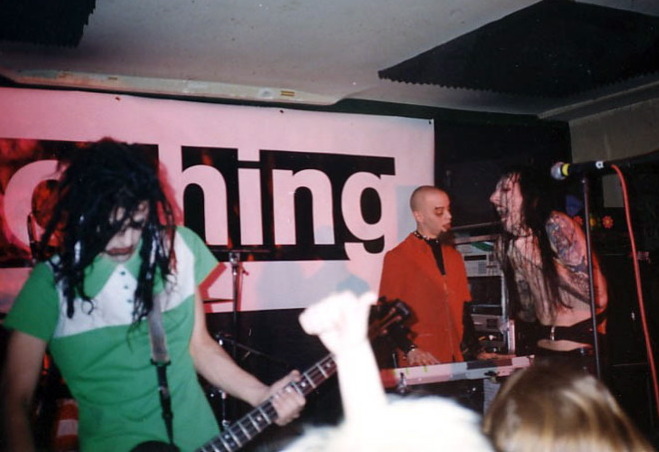|
I Don't Like The Drugs (But The Drugs Like Me)
"I Don't Like the Drugs (But the Drugs Like Me)" is a song by American rock band Marilyn Manson. It was released as the second single from their third studio album, ''Mechanical Animals'' (1998). It was written by the band's eponymous frontman, along with bassist Twiggy Ramirez and then-guitarist Zim Zum, and was produced by Manson and Michael Beinhorn. A glam rock song inspired by drugs, television, and religion, the track features a gospel choir and a guitar solo by Dave Navarro of Jane's Addiction. The song garnered a mostly positive response from music critics, who complimented its catchiness and memorability. Critics noted similarities between "I Don't Like the Drugs (But the Drugs Like Me)" and the music of David Bowie, particularly his song " Fame" (1975), as well as the work of Manson's contemporaries. The song's stance on drugs garnered differing interpretations; some critics felt it glamorized drug use, while others saw it as anti-drug. Its music video was directed b ... [...More Info...] [...Related Items...] OR: [Wikipedia] [Google] [Baidu] |
Marilyn Manson (band)
Marilyn Manson is an American rock band formed by namesake lead singer Marilyn Manson and guitarist Daisy Berkowitz in Fort Lauderdale, Florida, in 1989. Originally named Marilyn Manson & the Spooky Kids, they gained a local cult following in South Florida in the early 1990s with their theatrical live performances. In 1993, they were the first act signed to Trent Reznor's Nothing Records label. Until 1996, the name of each member was created by combining the first name of a female sex symbol and the last name of a serial killer, for example Marilyn Monroe and Charles Manson. Their lineup has changed between many of their album releases; the eponymous lead singer is the only remaining original member. In the past, band members dressed in outlandish makeup and costumes, and engaged in intentionally shocking behavior both onstage and off. Their lyrics often received criticism for their anti-religious sentiment and references to sex, violence and drugs, while their live performan ... [...More Info...] [...Related Items...] OR: [Wikipedia] [Google] [Baidu] |
Dave Navarro
David Michael Navarro (born June 7, 1967) is an American guitarist. He is best known as a member of the rock band Jane's Addiction, with whom he has recorded four studio albums. Between 1993 and 1998, Navarro was the guitarist of the Red Hot Chili Peppers, recording one studio album, '' One Hot Minute'' (1995), before departing. He has also released one solo album, '' Trust No One'' (2001). Navarro has also been a member of Jane's Addiction-related bands Deconstruction and the Panic Channel. AllMusic's Greg Prato described Navarro as "one of alternative rock's first true guitar heroes", with an eclectic playing style that merges heavy metal, psychedelia, and modern rock. "He's one of the last great guitarists," said Henry Rollins, former Black Flag singer, who saw him playing with Jane's Addiction. Navarro was also the host and one of the judges on '' Ink Master'', an American tattoo competition reality series that aired on Paramount Network (formerly called ''Spike'') ... [...More Info...] [...Related Items...] OR: [Wikipedia] [Google] [Baidu] |
Record Chart
A record chart, in the music industry, also called a music chart, is a ranking of recorded music according to certain criteria during a given period. Many different criteria are used in worldwide charts, often in combination. These include record sales, the amount of radio airplay, the number of downloads, and the amount of streaming activity. Some charts are specific to a particular musical genre and most to a particular geographical location. The most common period covered by a chart is one week with the chart being printed or broadcast at the end of this time. Summary charts for years and decades are then calculated from their component weekly charts. Component charts have become an increasingly important way to measure the commercial success of individual songs. A common format of radio and television programmes is to run down a music chart. Chart hit A ''chart hit'' is a recording, identified by its inclusion in a chart that uses sales or other criteria to rank popula ... [...More Info...] [...Related Items...] OR: [Wikipedia] [Google] [Baidu] |
Mainstream Rock (chart)
Mainstream Rock is a music chart in '' Billboard'' magazine that ranks the most-played songs on mainstream rock radio stations in the United States, a category that combines the formats of active rock and heritage rock. The chart was launched in March 1981 as Rock Albums & Top Tracks, after which the name changed first to Top Rock Tracks, then to Album Rock Tracks, and finally to its current Mainstream Rock in 1996. History The Rock Albums & Top Tracks charts were introduced in the March 21, 1981, issue of ''Billboard''.Joel Whitburn. ''Joel Whitburn Presents Rock Tracks 1981–2008.'' Hal Leonard Corporation, 2008p. 6. The 50- and 60-position charts ranked airplay on album rock radio stations in the United States. Because album-oriented rock stations focused on playing tracks from albums rather than specifically released singles, these charts were designed to measure the airplay of any and all tracks from an album. Rock Albums was a survey of the top albums on American rock rad ... [...More Info...] [...Related Items...] OR: [Wikipedia] [Google] [Baidu] |
Alternative Songs
Alternative Airplay (formerly known as Modern Rock Tracks (1988–2009) and Alternative Songs (2009–2020)) is a music chart in the United States that has appeared in ''Billboard'' magazine since September 10, 1988. It ranks the 40 most-played songs on alternative and modern rock radio stations. Introduced as Modern Rock Tracks, the chart served as a companion to the Mainstream Rock chart (then called Album Rock Tracks), and its creation was prompted by the explosion of alternative music on American radio in the late 1980s. During the first several years of the chart, it regularly featured music that did not receive commercial radio airplay anywhere but on a few modern rock and college rock radio stations. This included many electronic and post-punk artists. Gradually, as alternative rock became more mainstream (spearheaded by the grunge explosion in the early 1990s), alternative and mainstream rock radio stations began playing many of the same songs. By the late 2000s, the g ... [...More Info...] [...Related Items...] OR: [Wikipedia] [Google] [Baidu] |
Billboard (magazine)
''Billboard'' (stylized as ''billboard'') is an American music and entertainment magazine published weekly by Penske Media Corporation. The magazine provides music charts, news, video, opinion, reviews, events, and style related to the music industry. Its music charts include the Hot 100, the 200, and the Global 200, tracking the most popular albums and songs in different genres of music. It also hosts events, owns a publishing firm, and operates several TV shows. ''Billboard'' was founded in 1894 by William Donaldson and James Hennegan as a trade publication for bill posters. Donaldson later acquired Hennegan's interest in 1900 for $500. In the early years of the 20th century, it covered the entertainment industry, such as circuses, fairs, and burlesque shows, and also created a mail service for travelling entertainers. ''Billboard'' began focusing more on the music industry as the jukebox, phonograph, and radio became commonplace. Many topics it covered were spun-of ... [...More Info...] [...Related Items...] OR: [Wikipedia] [Google] [Baidu] |
Pharmaceutical Industry
The pharmaceutical industry discovers, develops, produces, and markets drugs or pharmaceutical drugs for use as medications to be administered to patients (or self-administered), with the aim to cure them, vaccinate them, or alleviate symptoms. Pharmaceutical companies may deal in generic or brand medications and medical devices. They are subject to a variety of laws and regulations that govern the patenting, testing, safety, efficacy using drug testing and marketing of drugs. The global pharmaceuticals market produced treatments worth $1,228.45 billion in 2020 and showed a compound annual growth rate (CAGR) of 1.8%. History Mid-1800s – 1945: From botanicals to the first synthetic drugs The modern era of pharmaceutical industry began with local apothecaries that expanded from their traditional role of distributing botanical drugs such as morphine and quinine to wholesale manufacture in the mid-1800s, and from discoveries resulting from applied research. Intentional drug ... [...More Info...] [...Related Items...] OR: [Wikipedia] [Google] [Baidu] |
Capitalism
Capitalism is an economic system based on the private ownership of the means of production and their operation for profit. Central characteristics of capitalism include capital accumulation, competitive markets, price system, private property, property rights recognition, voluntary exchange, and wage labor. In a market economy, decision-making and investments are determined by owners of wealth, property, or ability to maneuver capital or production ability in capital and financial markets—whereas prices and the distribution of goods and services are mainly determined by competition in goods and services markets. Economists, historians, political economists and sociologists have adopted different perspectives in their analyses of capitalism and have recognized various forms of it in practice. These include ''laissez-faire'' or free-market capitalism, anarcho-capitalism, state capitalism and welfare capitalism. Different forms of capitalism feature varying ... [...More Info...] [...Related Items...] OR: [Wikipedia] [Google] [Baidu] |
Androgyny
Androgyny is the possession of both masculine and feminine characteristics. Androgyny may be expressed with regard to biological sex, gender identity, or gender expression. When ''androgyny'' refers to mixed biological sex characteristics in humans, it often refers to intersex people, who are born with congenital variations that complicate assigning their sex at birth. In comparison, hermaphroditism is the possession of both male and female reproductive organs. Regarding gender identity, androgynous individuals may identify with non-binary identities. Others may identify as transgender. As a form of gender expression, androgyny has fluctuated in popularity in different cultures and throughout history. Physically, an androgynous appearance may be achieved through personal grooming, fashion, or hormone treatment. Etymology The term derives from grc, ἀνδρόγυνος, from , stem - (''anér, andro-'', meaning man) and (''gunē, gyné'', meaning woman) through the ... [...More Info...] [...Related Items...] OR: [Wikipedia] [Google] [Baidu] |
Paul Hunter (director)
Paul Hunter is an American film director, screenwriter, and music video director. He has directed over 100 music videos, television advertisements and was nominated for an Emmy for Nike's Freestyle commercial. In 2004, the ''Washington Post'' called Hunter one of "most seminal names among black hip-hop directors." Hunter graduated from Cal State Northridge with a degree in Radio, TV & Film. Hunter has worked with musical artists including Whitney Houston, Aaliyah, Pharrell, Dr. Dre, TLC, Tyrese Gibson, Beyoncé, LL Cool J, Justin Timberlake, Lenny Kravitz, Janet Jackson, Mariah Carey, and Michael Jackson. Hunter made his feature-length directorial debut with '' Bulletproof Monk'', starring Chow Yun Fat and Seann William Scott. Hunter's directed the music video of Michael Jackson's come-back single, ' You Rock My World' and the award-winning "Lady Marmalade" video for the soundtrack to the film ''Moulin Rouge!'' (2001). While working with Prettybird, Hunter has also done c ... [...More Info...] [...Related Items...] OR: [Wikipedia] [Google] [Baidu] |
Fame (David Bowie Song)
"Fame" is a song recorded by English singer-songwriter David Bowie. It was released on his 1975 album ''Young Americans'' and was later issued as the album's second single by RCA Records in July 1975. Written by Bowie, Carlos Alomar and John Lennon, it was recorded at Electric Lady Studios in New York City in January 1975. It is a funk rock song that represents Bowie's dissatisfaction with the troubles of fame and stardom. The song was a major commercial success in North America, becoming Bowie's first number 1 single on both the US ''Billboard'' Hot 100 and the Canadian Singles Chart. The song was one of the most successful singles of the year, ranking at number 7 on the ''Billboard'' Year-End Hot 100. However, it was less successful in Europe, reaching number 17 in the UK Singles Chart. In 1990, Bowie remixed the song under the title "Fame '90" to coincide with his Sound+Vision Tour. "Fame" has since appeared on many compilation albums, and was remastered in 2016 as par ... [...More Info...] [...Related Items...] OR: [Wikipedia] [Google] [Baidu] |




_(6982162417).jpg)

